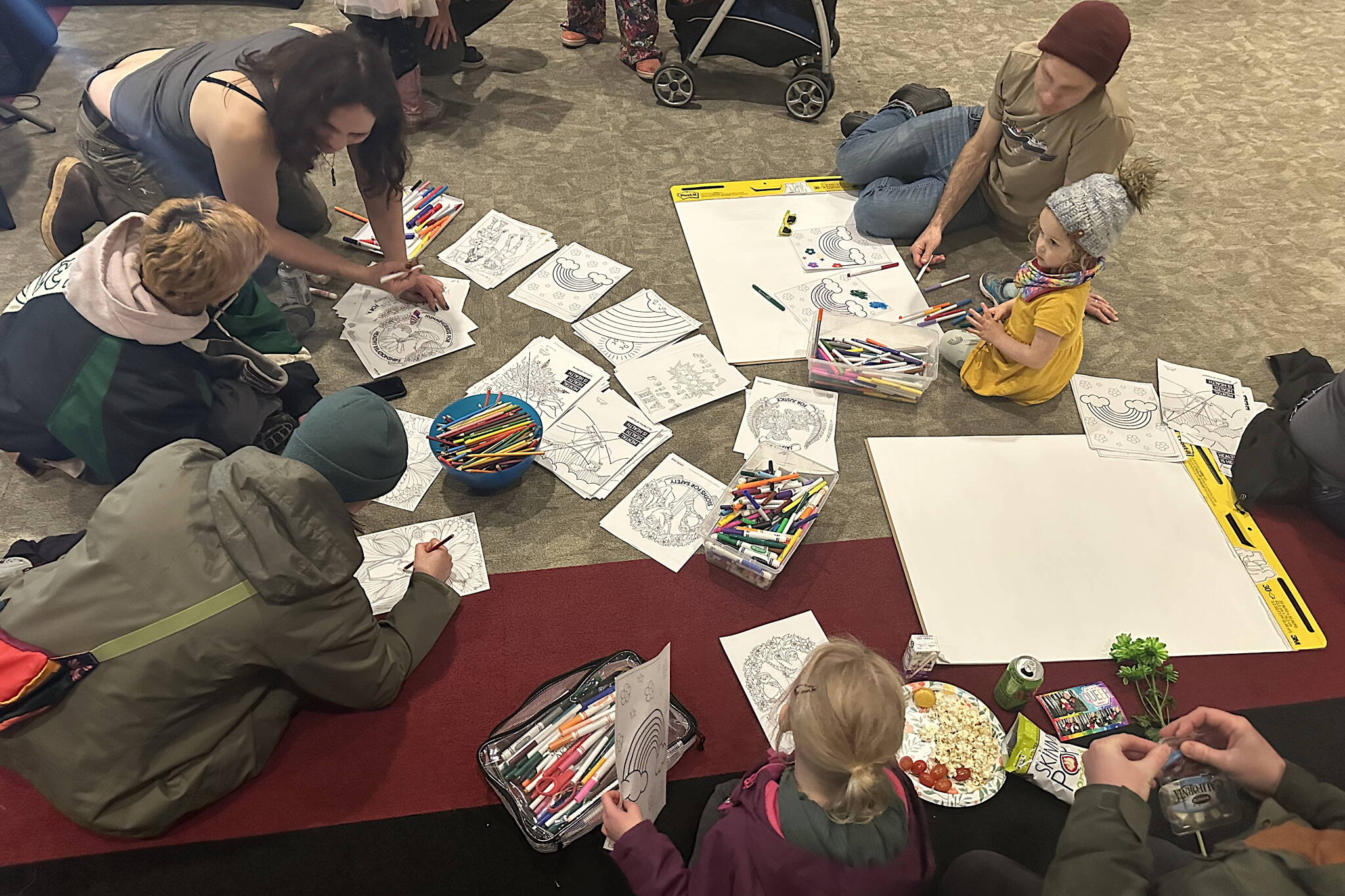With the Trump administration removing the “T” and “Q” from the LGBTQ+ acronym at certain federal websites — along with some gender-based rights — Juneau resident Kris Clark is among those saying she’s feeling targeted.
“It has definitely affected my friends in the trans community,” she said during a Unity for the Queer Community event Sunday afternoon that included a rally at the Alaska State Capitol and procession to activities at Elizabeth Peratrovich Hall. “I am a disabled queer woman and we’re next … And so I’m just in an anxious waiting pattern to see how it’s going to shake out.”
Similar concerns were expressed by Jes Kinville-James, a Juneau resident since 2018 who is caring for foster kids as well as her own while in a same-sex marriage.
“I think it’s a general sense of waiting for the other shoe to drop and is that shoe going to be on our neck?” she said. “And there’s definitely a lot of concerning things that are going on and I think it’s our responsibility to keep a really close eye on that so that we don’t lose the progress that we’ve made.”
Hundreds of people filled the main room at EPH in the latest of a series of protests and rallies by various groups — with others including federal workers subject to mass firings, refugees at risk of deportation and organizations facing funding freezes — since President Donald Trump returned to office Jan. 20.
“It feels like a panic tactic,” Clark said. “Like if they can throw us off, like inundate people with information, and then (people) have a tendency to shut down or get confused, or not know what to do to stop the progression of things that they don’t like.”
Specific actions so far by the Trump administration related to LGBTQ+ individuals include an executive order declaring the government would recognize only two genders, reversing the allowance of gender-neutral “X” designations in passports, ordering the removal of openly transgender service members from the military, banning gender-affirming care for people under 19, and prohibiting transgender athletes from competing in women’s and girls’ sports.
“The erasure of sex in language and policy has a corrosive impact not just on women but on the validity of the entire American system,” Trump wrote in his gender-defining executive order.
Clark, in contrast, said the changes occurring are targeting medical care and funding for it — including far-reaching cuts such as Medicaid — for her and other LGBTQ+ people she knows. Another concern related to well-being was voiced by Kinville-James, who said “there’s been pretty catastrophic things that happen at rallies and protests like this, and you know, that’s worrisome.”
The Trump administration has also removed a large amount of LGBTQ+ content from federal health, history and other websites — although some has been restored after criticism and/or further scrutiny.
A nationwide survey published March 4 by the Public Religion Research Institute found about three-fourths of respondents support nondiscrimination protections for LGBTQ+ people in housing, employment and public accommodation. Conversely, a New York Times/Ipsos poll conducted in January found 79% of adult respondents opposed transgender female athletes participating in women’s sports.
Locals at Sunday’s unity gathering were focusing more on affirmation of those present than specific political goals.
“I wanted us to do something really fun and lively, and just come together,” said Daaljíni Mary Cruise, lead organizer for the event, said at the beginning of her remarks to the crowd at the rally at the Capitol. “Because I think sometimes we feel like we’re all alone, or we feel like our community is really small, and this right here shows me that our community is not small.”
The group grew in size during the rally, as it proceeded through downtown and after reaching EPH. Activities there ranged from coloring for kids to dances featuring a Native youth group and performers with Juneau Drag.
Such performances were targeted by Trump, who in a social media message last month announced he was making himself head of the new board at the Kennedy Center to stop productions including “Drag Shows specifically targeting our youth.” That resulted in protests from performers nationwide who said the action amounts to censorship of an art form that can offer a message about celebrating differences in a family-friendly fashion — which was echoed by people at Sunday’s gathering.
“I think that people have a really big misunderstanding about who trans people are, and that’s really evident when we see these kind of salacious headlines about anti-trans policies and so forth,” said James Hoagland, also known as the Juneau Drag performer Gigi Monroe, during a break in the group’s performances. “But I think that no one really takes a chance to listen to who trans people are, listen to the trans community and be able to engage in a real conversation about it, because I think there’s just a lot of misconceptions going on. And those snowball, and they become bigger and bigger and bigger. And so we have these national campaigns about things that are not even their issues.”
Contact Mark Sabbatini at mark.sabbatini@juneauempire.com or 907-957-2306.


